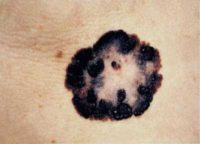
11 Sep IMPRES Score Predicts Melanoma Response to Immunotherapy
MedicalResearch.com Interview with:

This image depicts the gross appearance of a cutaneous pigmented lesion, which had been diagnosed as superficial spreading malignant melanoma (SSMM). Reminder: Melanoma can take many forms. Not all look like this. Have your skin examined for skin cancer.
Dr. Noam Auslander PhD
National Cancer institute and the Center for Bioinformatics and Computational Biology University of Maryland, College Park
MedicalResearch.com: What is the background for this study?
Response: Immunotherapy – specifically immune checkpoint blockage (ICB) therapy – has been shown to be very effective in treating melanoma. However, only some patients with advanced tumors currently benefit from ICB therapies, while others are completely resistant and hence can be spared from the associated side effects and costs. Hence, predicting which patients are most likely to respond is an important challenge that can have great clinical benefits.
MedicalResearch.com: What are the main findings?
Response: In this study, we developed an immuno-predictive score, (called IMPRES), to help predict ICB response in melanoma. We found that IMPRES robustly predicts the response to immune checkpoint blockage therapy for almost 300 melanoma samples, from pre and early on treatments samples, treated with different therapies (both anti PD-1 and anti CTLA-4). IMPRES, is a simple score counting immune relations (such as A>B) between 15 pairs of genes, encoding immune inhibitory and activators molecules. The list of relations was composed to predict tumor spontaneous regression in neuroblastoma, since we hypothesized that the immune mechanism underlining spontaneous regression are similar to those underlining the response to immune checkpoint blockage therapy.
MedicalResearch.com: What should readers take away from your report?
Response: IMPRES outperforms existing predictors for all treatment groups and captures almost all true responders while misclassifying less than half of the nonresponders. IMPRES shows potential for clinical utility, and now must be further tested in a clinical trial. If further proven for its clinical utility, IMPRES may help to identify patients that are unlikely to respond to immune checkpoint blockage therapy and spare them from the associated adverse effects and costs. Additionally, it may potentially assist in clinical decision making such as deciding which patients should be treated with combination of drugs and which are likely to respond to a single drug, from their IMPRES scores.
MedicalResearch.com: What recommendations do you have for future research as a result of this work?
Response: First, we find that the binary relations used as features for IMPRES are more robust than single genes used individually. It may be beneficial to consider this data representation in future studies when investigating the immune response. Second, this study points to some immune-mediated similarities between melanoma and neuroblastoma, which may be implying on the potential utility of immune checkpoint blockage therapy in neuroblastoma in the future.
Disclosures: No disclosures.
Citation:
Noam Auslander, Gao Zhang, Joo Sang Lee, Dennie T. Frederick, Benchun Miao, Tabea Moll, Tian Tian, Zhi Wei, Sanna Madan, Ryan J. Sullivan, Genevieve Boland, Keith Flaherty, Meenhard Herlyn, Eytan Ruppin. Robust prediction of response to immune checkpoint blockade therapy in metastatic melanoma. Nature Medicine, 2018; DOI: 10.1038/s41591-018-0157-9
[wysija_form id=”3″]
[last-modified]
The information on MedicalResearch.com is provided for educational purposes only, and is in no way intended to diagnose, cure, or treat any medical or other condition. Always seek the advice of your physician or other qualified health and ask your doctor any questions you may have regarding a medical condition. In addition to all other limitations and disclaimers in this agreement, service provider and its third party providers disclaim any liability or loss in connection with the content provided on this website.
Last Updated on September 12, 2018 by Marie Benz MD FAAD
